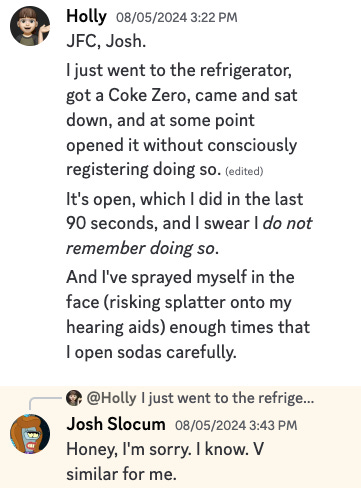This is a creative writing post (#35) from my occasional series for paid subscribers, who can also leave comments on most posts. As always, email hollymathnerd at gmail dot com if you would like a paid subscription but can’t afford one.
Context: I live with complex-PTSD, and have since childhood. One of the major symptoms is disassociation. I have struggled to explain this to other people, with varying levels of success. I’m extremely disassociated most of the time lately, and decided to try to write about it.
In one of my favorite novels, A Widow for One Year by John Irving, a novelist named Ruth Cole is the main character. In the course of the book, she writes a novel about a novelist who’s writing a novel. Her father, mother, best friend, and an important figure in her life—someone who plays a pivotal role in the summer that changes everything for all the important characters—are all writers, too. That sounds like the most gimmicky thing imaginable, but it works powerfully well. It’s a story about the power of imagination and the choices made by writers and how they shape lives, of writers and readers alike, in ways both predictable and not. In particular, it’s a story about the power of writing to process loss and make grief, especially grief of the sort that severs all chance at a normal life, into something bearable.
Because I enjoy writing, when I really love a novel I often think about the writing process that produced it. I enjoy imagining Irving, a novelist, being asked by his friends what the new book would be about. “A novelist who, in the course of the story, plots and writes a novel about a novelist who’s writing a novel. Also several other writers write novels. And the process of reading the novels written by the novelists in her life helps the novelist both to understand herself and to shape the novelist in the novel she writes…in the novel which I, a novelist, am now writing.”
I think about that novel a lot. I consider it a masterpiece in writing for many reasons and about many of its topics and themes, but especially coming to terms with the flaws and failures of well-meaning but profoundly imperfect (as opposed to abusive) parents. That’s something I had very little perspective about, and reading several novels on this theme was a very helpful process for me. This novel was far and away the most helpful, and it’s the one I’ve returned to over and over.
I also think about it for the otherworldly quality—all those fictional universes being shaped and shaping others within the fictional universe of the story—as I’ve been badly disassociated for something close to a month.
A lot of people, even people without any PTSD issues, are experiencing some level of disassociation these days, as my friend
has covered in his Substack and on his talk show. The usual rules of reality seem to have stopped applying, as it was less than a month ago that one of the major Presidential candidates came within inches of dying via assassination—and yet it’s like it never happened. The Olympics have brought us gaslighting on a global scale as obvious men are awarded prestigious medals in women’s competitions. And other things have, at least here in New England, never returned to their pre-COVID normal. I still call before I go many places to make sure they’re open, and failure to do so often results in disappointment and a “Closed due to lack of staff” sign on the door—as recently as last week.What I am experiencing, in other words, is a more severe version of something that many people are experiencing. That’s why I’m writing about it here—in the hopes of both finding clarity for myself and bringing understanding to others who may be experiencing some version of it as well.
What’s going on with me?
My entire life feels like a fictional universe in flux, as if I were a character in one of Ruth Cole’s novels, waiting to see what changes she has in store for me. I catch myself watching myself, wondering what I’ll do and how I’ll feel about it, as if I were someone else studying me via a hidden camera feed.
Sometimes it’s a small thing, as when this happened on Monday:
It was the fourth or fifth small thing like that during Monday’s workday. I also tripped over my Roomba, which I started running and then forgot I had started running—contrary to my usual practice, without my hearing aids in—and went outside to check the mail, found the mailbox empty, and came back inside to see the already-retrieved mail sitting atop the stove where I’d left it.
It’s hard to explain what disassociation is like, so before I try I’m going to give several more examples. Then I’m going to try to explain what it is by explaining the usual definitions, what it’s like at least for me, where it comes from, and why it’s happening.
At least some of you have also experienced disassociation without conscious understanding of what it is or what it means, so I hope those sections will be helpful. Then I’ll finish with the tactics and strategies that help me deal with minor disassociative episodes, even though they’re not very helpful for major ones, such as what I’m experiencing at the moment.
Extra space to allow for the “unlock one post free” option that Substack offers on paywalled posts, in order to give free subs a chance to see what they’re missing.





